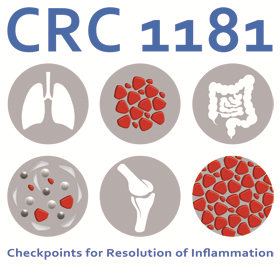Corona meets arthritis, colitis and psoriasis
Are treatments for immune-mediated inflammatory diseases safe in times of the Corona pandemics?
In the Erlangen Corona Study, comprising more than 2000 subjects, the risk for developing antibodies against the new coronavirus was tested in patients with arthritis, colitis and psoriasis by the Deutsche Zentrum für Immuntherapie (DZI) and Collaborative Research Center (CRC) 1181. The results of this study were just published in Nature Communications.
Scientists at the DZI and of CRC1181 started with this study very early in the course of the Corona pandemics, as many patients with arthritis, colitis and psoriasis take medications that inhibit inflammation and modulate the immune response. Therefore, the concern was that such patients with such diseases and respective treatments are particularly vulnerable to severe courses of coronavirus disease. In the Erlangen Corona Study patients with immune-mediated inflammatory diseases (IMIDs) were assessed for signs of respiratory infection, interviewed for contacts with infected persons and investigated for antibodies against the new coronavirus. In addition, a large number of healthy controls were tested.
Results showed that IMIDs patients including those with arthritis (rheumatoid arthritis, ankylosing spondylitis), colitis (Crohn’s disease, ulcerative colitis) and psoriasis receiving treatment with immune-modulatory drugs (so called cytokine inhibitors) had a lower but not higher risk for developing antibodies against the new coronavirus. These data suggest that there is a partial protection from infection with the new coronavirus in such patient. Prof. Georg Schett (Head of Department of Internal Medicine 3 – Rheumatology and Immunology), Prof. Markus Neurath (Head of Department of Internal Medicine 1 – Gastroenterology, Pneumology and EndocrinologyImmunology) and Prof. Michael Sticherling (dermatology) state that „The low risk for developing infections with the new coronavirus in patients with IMIDs is highly interesting and may be based on the effects of anti-inflammatory drugs on blocking the often exaggerated immune response of the host against the virus.”
Overall these results have substantial impact for arthritis, colitis and psoriasis patients as the data indicate the continuation of anti-inflammatory treatment is recommendable and may be even beneficial. The results also show that neither the respective inflammatory disease nor the anti-inflammatory treatment exposes patients at risk for developing severe coronavirus disease.
The Erlangen Corona Study is an interdisciplinary approach under the umbrella of the DZI and the Institute of Virology in Erlangen and was supported by the Deutsche Forschungs-gemeinschaft (DFG, project CRC1181), the Ministry for Education and Sciences (BMBF, project Mascara) and the Schreiber Foundation. The researcher involved in this study express their thanks to all study participants.
Simon, D., Tascilar, K., Krönke, G. et al. Patients with immune-mediated inflammatory diseases receiving cytokine inhibitors have low prevalence of SARS-CoV-2 seroconversion. Nat Commun 11, 3774 (2020). https://doi.org/10.1038/s41467-020-17703-6
Further information
Prof. Dr. med. univ. Georg Schett
Phone +49 9131 85-39109
georg.schett@uk-erlangen.de

